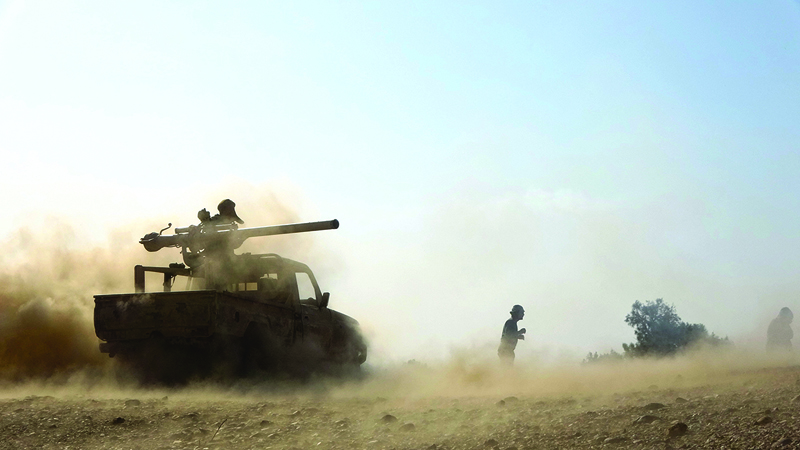 SANAA: Saudi-backed government troops repel a Houthi rebel offensive on oil-rich Marib, some 120 kilometers (75 miles) east of Yemen's rebel-held capital Sanaa.-AFP
SANAA: Saudi-backed government troops repel a Houthi rebel offensive on oil-rich Marib, some 120 kilometers (75 miles) east of Yemen's rebel-held capital Sanaa.-AFPDUBAI: The UN's humanitarian chief said yesterday he was "very alarmed" by a Houthi rebel advance on the Yemeni government's last northern stronghold, saying an assault on Marib could endanger millions of civilians. The Iran-backed Houthis have this month resumed an offensive to seize oil-rich Marib, some 120 kilometers (75 miles) east of the rebel-held capital Sanaa. The city's loss would be a major blow for Yemen's government, which is backed by a Saudi-led coalition, but also for the civilian population and the hundreds of thousands of displaced people sheltering in desolate camps in the region.
"I'm very alarmed about the military escalation in Marib and its impact on the humanitarian situation," Mark Lowcock, the UN undersecretary general for humanitarian affairs, said in a tweet. "An assault on the city would put two million civilians at risk, with hundreds of thousands potentially forced to flee-with unimaginable humanitarian consequences. Now is the time to de-escalate, not to add even more to the misery of the Yemeni people."
Military officials told AFP that the rebels had advanced towards the city on two fronts overnight after heavy fighting with government forces. Dozens from both sides have been killed in the past 24 hours alone, they said. The total casualty toll from the battle for Marib is unknown but reports indicate it is now in the hundreds.
"The rebels have advanced north and west of the city after seizing Al-Zor (in Sirwah district) up to the western sides of Marib dam, and tightened their grip on hills overlooking supply lines for several fronts," one of the officials said. The military coalition, which entered Yemen's conflict in 2015, has been pounding rebel positions, and the Houthi-run Al-Masirah television yesterday reported 13 airstrikes in several areas in Marib.
Once a sanctuary
The fighting is endangering sprawling camps for internally displaced people, many of whom have fled several times before ending up in Marib, the only part of the north not in Houthi hands. Until early 2020, Marib city was spared the worst of Yemen's six-year-old conflict, due to its strategic importance with its rich oil and gas reserves, and also because of its location near the border of regional power Saudi Arabia. It became a sanctuary for many in the early years of the war, taking in those hoping for a new start.
But that relative stability went with fighting last year and-after a lull since October-residents once again risk being in the line of fire as the two sides battle for control. "If fighting moves towards populated areas or these displacement sites, we will see people flee again and towards locations to the east and south of Marib city with even less resources," International Organization for Migration spokeswoman Olivia Headon said.
"Much of this is desert area so just think about what any displacement in that direction would mean for families' access to water." Headon said around 650 families had been forced to flee in the recent upsurge of fighting and that another shift in the frontlines would lead to further waves of displacement. Yemen's grinding conflict has claimed tens of thousands of lives and displaced millions, according to international organizations, sparking what the UN calls the world's worst humanitarian crisis.
The upsurge in violence comes shortly after Washington decided to remove the rebels from its list of terrorist groups-a move that would come into effect yesterday-in order to ensure aid is unimpeded, and to pave the way to restart peace talks. Observers say the Houthis want to capture Marib as leverage before entering into any negotiations. The rebels have also escalated attacks against Saudi Arabia. Its state media said yesterday that another "booby-trapped drone" launched by the Houthis had been intercepted and destroyed near Abha airport, which earlier this month was struck by an attack that left an aircraft in flames. - AFP









